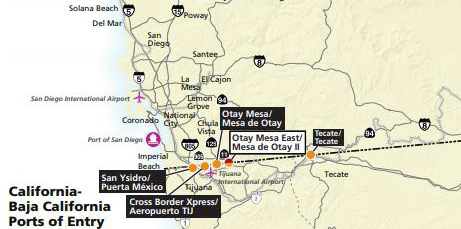Harnessing Your Domestic TMS as Reshoring Trends Continue
 Of the many things 2020 taught us, one key takeaway was understanding the global supply chain’s volatility. In the blink of an eye, offshoring manufacturing halted worldwide, forcing companies to find alternative ways to meet demand and advancing the reshoring discussion. For companies evaluating reshoring possibilities, they needed reliable and predictable transportation operations and found a solution by leveraging a domestic transportation management system (TMS) such as 3GTMS, to realize more efficiencies and cost savings.
Of the many things 2020 taught us, one key takeaway was understanding the global supply chain’s volatility. In the blink of an eye, offshoring manufacturing halted worldwide, forcing companies to find alternative ways to meet demand and advancing the reshoring discussion. For companies evaluating reshoring possibilities, they needed reliable and predictable transportation operations and found a solution by leveraging a domestic transportation management system (TMS) such as 3GTMS, to realize more efficiencies and cost savings.
Trends Toward Reshoring
As the COVID-19 pandemic took hold, many companies struggled with gaps on their supply-side because trade partners around the world stop manufacturing processes. Even when manufacturing came back online, global transportation providers still weren’t prepared to move goods at the same pace. Whether there were truck driver shortages in other nations or overloaded ports on America’s shores, bringing in cargo from other countries proved to be challenging. This forced reshoring companies to place even more focus on building a successful domestic transportation operation.
Domestic Transportation Factors to Consider with Reshoring
Revaluating sourcing is no easy task, and a multitude of factors need to be considered before making any moves. Examples of basic questions to start the thought process include what new suppliers can produce the quality of product that meets customer expectations? Do potentially higher manufacturing costs mitigate the risks of global trade? Does it make sense to bring everything back, pivot toward nearshoring, or create a parallel supply chain?
But more complicated questions begin to arise, particularly around the management of your new domestic transportation processes. For example, if most of your manufacturing was abroad with the same port to plant lanes, do you even have domestic TMS technology? If not, then it’s a gap you will want to fill as your volume increases.
Now, what if you do have a domestic TMS? Does it deliver the advanced automation, complex carrier rating, and required freight options to maximize cost savings? Can it scale with your current staff? And maybe most importantly, is it cloud-based so your employees can use it anywhere?
If your answer to these questions is no, then it makes sense for you to explore how a new transportation management system can help boost your bottom line and simplify your increased domestic transportation needs.
How a TMS Helps Solve Reshoring
If you intend to bring manufacturing back home, there are many tools that a domestic transportation system provides to help enhance your operations.
- Optimizing Spot Purchasing Transportation – Saving money on raw materials is a priority, so purchasing when rates are low is a no-brainer. TMS route planning creates the most efficient and cost-effective lanes to transport your spot purchases to your manufacturing centers.
- Real-Time Complex Carrier Rating – A TMS provides and locks real-time carrier ratings, so you receive the market rate on freight transportation, allowing you to choose the most affordable way to move your freight.
- Load Consolidation Automation – Save money by maximizing trailer capacity with load consolidation, giving you the most value on each move without taking up your employee’s precious time.
- Dynamic Freight Options – Receive the most economical options to move your freight, whether it’s with full truckloads (TL), less-than-truckloads (LTL), parcel, multi-stop, dynamic pooling, and more.
Taking Transportation to the Next Level
Putting together a scalable transportation strategy turns complex with different routes, carriers, load types, and other variables. A major advantage is finding a TMS that helps you transport goods effectively, while delivering efficiencies that maximize your reshoring initiative. If you haven’t yet, exploring the TMS market could benefit you greatly as you build your new domestic transportation network.
 Stephanie Richelieu Stagger is the Chief Revenue Officer at 3GTMS. Stephanie spent the last 20 years dedicated to advancing the positive impact supply chain software services bring to shippers and logistics providers around the world.
Stephanie Richelieu Stagger is the Chief Revenue Officer at 3GTMS. Stephanie spent the last 20 years dedicated to advancing the positive impact supply chain software services bring to shippers and logistics providers around the world.



